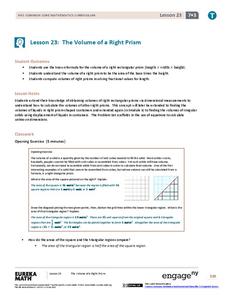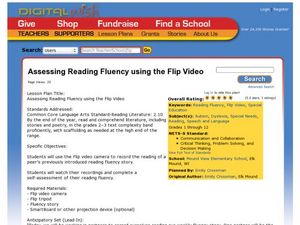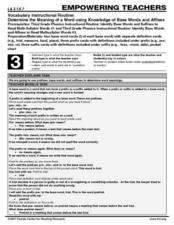EngageNY
The Area of a Circle
Introduce learners to two methods to estimate the formula for the area of a circle. The first method uses a sector of a circle to form a rectangle, and the other uses grids to estimate the area. The problems in the 18th segment of a...
EngageNY
Volume and Surface Area II
Determine the cost of projects based on volume or surface area. Pupils work problems to determine the cost of building a brick planter and a stainless steel feeder in the 27th installment of a 28-part series. Participants must consider...
EngageNY
The Volume of a Right Prism
Does the volume formula work even if the measurements are not whole numbers? Class members work simple problems to find that the formula (area of the base) × (height) works for all prisms, independent of measurements and shape.
EngageNY
Identifying Proportional and Non-Proportional Relationships in Tables
Learners determine whether there is a constant multiple within the table through an instructional activity that presents a method for determining whether two quantities are proportional. Pupils analyze tables to determine if they...
EngageNY
Multi-Step Ratio Problems
Use ratios to solve problems that are not proportions. The instructional activity has pupils solve multi-step ratio problems that involve fractional increases and decreases. The problems involve mark-ups, discounts, commissions, and...
EngageNY
Interpreting Graphs of Proportional Relationships
What do those points on the graph mean? The 10th instructional activity in a series of 22 presents proportional relationships as graphs. Class members interpret various points of the graph — including the origin — within the context of...
Judicial Branch of California
American Heroes
What makes a hero? After discussing the term and considering a book about Franklin D. Roosevelt, classmates work together to write a script and present their biography of a Great American hero. Notes sheets help group members organize...
National Endowment for the Humanities
Doing Oral History with Vietnam War Veterans
Get the story from those who experienced it. Engage learners with a structured oral history project involving Vietnam War era veterans. By conducting thoughtful interviews, class members learn what it was like to serve in the...
ReadWriteThink
Heroes Are Made of This: Studying the Character of Heroes
What makes heroes and villains? A six-part unit plan asks young scholars to explore the concept of heroism and the characteristics they consider heroic and unheroic. Groups create character maps that focus on how characters are shaped by...
Academy of American Poets
Teach This Poem: "In cold spring air" by Reginald Gibbons
Reginald Gibbons' poem "In cold spring air" provides learners with a chance to develop their noticing skills. As a warm-up, class members watch Paul McCartney's video singing "Blackbird" and note words and phrases that stand out. They...
Academy of American Poets
Teach This Poem: "Black Laws" by Roger Reeves
After investigating the Black Lives Matter movement, class members do a close read of Roger Reeves' "Black Laws." They write down words and phrases that rhyme, consider the kinds of rhymes used and their function in the poem. Scholars...
K20 LEARN
LBJ and Voting Rights
Challenges to voting rights is not a new thing. Using President Lyndon B. Johnson's 1965 "The American Promise" speech on voting rights as a starting point, young historians research current voting rights laws and challenges.
K20 LEARN
Power to the People
Black berets, black leather jackets, raised black fists, chants of "Power to the People!" These are the images that many associate with the Black Panther Party. Often forgotten are the programs the party created during the Civil Rights...
K20 LEARN
"The Lady, Or The Tiger?" Which Do You Choose?: Internal and External Conflict
"How come there's no ending?" After a close reading of Frank R. Stockton's tale "The Lady, or the Tiger?" in which scholars examine each of the main characters' conflicts and motivations, writers craft their own ending using textual...
K20 LEARN
Freedom And Restraint: Elements Of Fiction
Kate Chopin's short story, "The Story of an Hour" and John H. Young's "Our Deportment, or the Manners, Conduct, and Dress of Refined Society" offer high school juniors an opportunity to compare the role of women in the 19th century with...
EngageNY
Computing Actual Lengths from a Scale Drawing
Class members take scale drawings and examine scales to determine distances in the actual objects. Pupils convert the scales of different units to scale factors that can be used in proportional equations.
EngageNY
Equations of Graphs of Proportional Relationships Involving Fractions
The 15th segment in a series of 22 uses examples that present proportional relationships with fractions. Pupils work through the problems and discover that the process is the same as it is with whole number values. Graphing the...
Curated OER
Catching a Rolling Ball
Here are a series of activities to practice catching a rolling ball. There are specific directions and cues that are being scaffolded in this PE lesson. The scaffolding will also allow for a check to see what the players might need to...
EngageNY
Completing the Square (part 2)
Give classes confidence in completing the square with a resource that develops the process of completing the square of more complex problems, including fractions and values greater than one. It then uses quadratic modeling for...
Media Smarts
Teaching TV: Learning With Television
As part of a series of resources focused on the influence of television, elementary students watch an educational program and identify the information presented and analyze the point of view from which the information is...
Teaching English
Fairy Tales; Not Just for Kids
"Once upon a time . . ." Language learners examine the key elements of well-known fairy tales and then craft their own.
Curated OER
Assessing Reading Fluency Using the Flip Video
Utilizing a video camera, learners will read a story while being recorded. Later, they analyze the footage. After identifying their strengths and weaknesses with the teacher, they discuss reading fluency techniques. Adaptation: Instead...
Curated OER
Determine the Meaning of a Word Using Knowledge of Base Words and Affixes
Affixes can change the entire meaning of a word! Pupils practice with three prefixes and three suffixes in this scaffolded word meaning resource. There are affix cards here you can display in a pocket chart as you review. Learners first...
Shakespeare Uncovered
“Speak, I Charge You”: Macbeth On Your Feet, Not In Your Seat
“Is this a dagger which I see before me . . .” As part of a study of Macbeth, class members engage in a series of activities that get them up and moving. Individuals practice, then deliver, a line from the Scottish play. The entire class...























